10 Best Stonly Alternatives for Onboarding and Support
Last updated on Thu Sep 18 2025
Finding the right Stonly alternative starts with understanding your team’s biggest challenge—whether it’s onboarding, scaling support, or driving adoption at an enterprise level. Stonly built its name on interactive guides and adaptive knowledge delivery, but today’s market is full of tools that push those ideas further.
Platforms like Intercom and Zendesk layer in AI agents and omnichannel support, while Pendo and Appcues combine in-app guidance with product-led growth. For startups, lightweight options like Flook provide fast, no-code onboarding.
Enterprises often lean on WalkMe or Whatfix for adoption at scale, while Helpjuice and Document360 stand out for structured knowledge management. In this guide, we’ll break down the top Stonly alternatives, their strengths, and how to choose the best fit.
1. Intercom

Intercom is an AI-first customer service suite built around Fin AI Agent, which automatically resolves customer questions across chat, email, phone, and more. Unlike traditional helpdesks, Intercom pairs Fin with a modern inbox, automation builder, and proactive support tools, giving teams both agent efficiency and customer self-service in one platform. It’s built for scaling startups and enterprises that want faster resolution, reduced ticket volume, and contextual, AI-driven support experiences.
Platform type: AI helpdesk and customer support automation
Features:
Fin AI Agent ($0.99 per resolution) with customizable tone and actions
Modern shared inbox and ticketing system
Public and multilingual help centers
Automated workflows and round-robin assignment
Proactive support tools (checklists, tours, surveys, posts)
Copilot: AI assistant inside the agent inbox
SSO, HIPAA support, SLAs, and multi-brand support on higher tiers
100+ integrations with Zendesk, Salesforce, and more
Pricing:
Intercom’s Essential plan starts at $29/seat/month with Fin billed at $0.99 per resolution. Advanced ($85/seat/month) adds automation and multilingual support, while Expert ($132/seat/month) unlocks enterprise features like SSO and SLAs. Fin can also run standalone on Zendesk or Salesforce at the same $0.99/resolution rate. Startups can apply for 90% off for the first year.
2. Zendesk

Zendesk is one of the most established customer support platforms, now supercharged with AI agents and automation. It consolidates every support channel—email, chat, voice, social, and self-service—into a unified agent workspace, giving teams the context they need to resolve tickets faster. With AI-powered deflection, customizable help centers, and robust reporting, Zendesk scales from small businesses to enterprise contact centers without losing ease of use.
Platform type: Customer service and AI-driven helpdesk
Features:
AI agents for automated resolutions across channels
Unified agent workspace with ticketing and customer context
Generative replies and customizable AI personas
Knowledge base with generative search
Omnichannel support: email, chat, phone, social, WhatsApp, Slack
IVR phone trees, call routing, and voice support
Advanced reporting, dashboards, and analytics
Integrations with 1,000+ apps and CRMs
HIPAA compliance, audit logs, and enterprise security options
Pricing:
Zendesk pricing starts with Support Team at $19/agent/month (annual) for email and ticketing. Suite Team ($55/agent/month) adds AI agents, a knowledge base, and omnichannel messaging. Suite Professional ($115/agent/month) introduces advanced reporting, SLAs, and multiple help centers, while Suite Enterprise ($169/agent/month) unlocks custom roles, sandboxes, and up to 300 help centers. AI resolutions are billed separately at $1.50–$2 per resolution, with volume discounts available.
3. Pendo
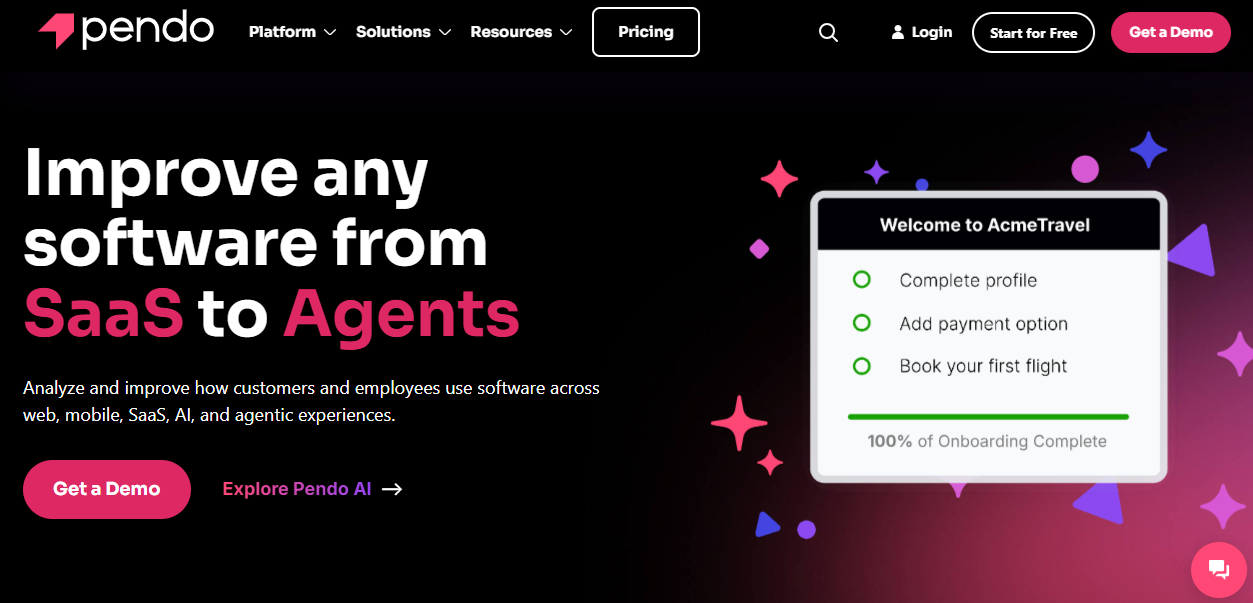
Pendo is a Software Experience Management (SXM) platform that blends product analytics, in-app guides, feedback collection, and AI to optimize how people use software. While Stonly focuses tightly on knowledge delivery and guided support, Pendo casts a wider net, combining digital adoption with product-led growth, sentiment tracking, and workflow optimization. Both tools excel at onboarding and in-app guidance, but Pendo is better for holistic product analytics and feedback loops, whereas Stonly leans into support and troubleshooting.
Platform type: Software experience management and digital adoption
Features:
Product analytics with behavioral and retention insights
In-app guides, walkthroughs, and personalized onboarding
NPS, surveys, and sentiment tracking
Feedback capture and product discovery tools
Session replay to visualize user struggles
AI-powered localization, recommendations, and orchestration
Roadmapping and journey automation
Integrations with Salesforce, HubSpot, Zendesk, and more
Pricing:
Pendo pricing is based on monthly active users (MAUs). The Free plan includes analytics, guides, NPS, and roadmaps for up to 500 MAUs. Paid tiers scale with usage: Base (analytics + guides), Core (adds session replay), Pulse (adds NPS and product discovery), and Ultimate (advanced orchestration and data sync). Pricing is custom-quoted based on volume, but teams can start free and expand as adoption grows.
4. Flook
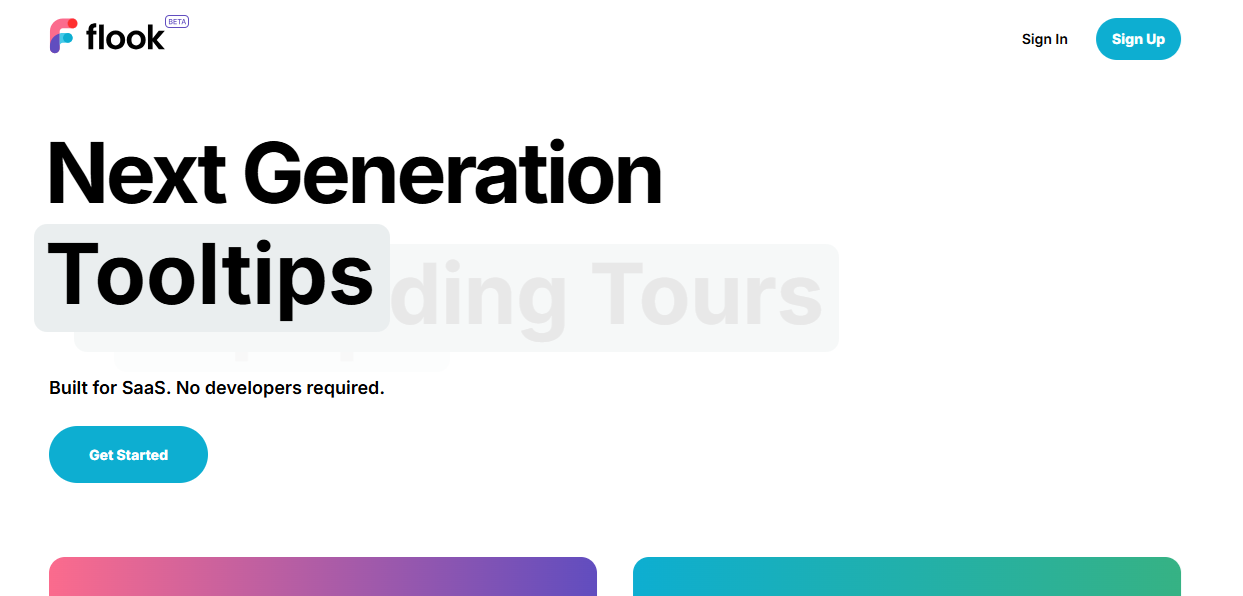
Flook is a lightweight no-code onboarding platform designed for SaaS teams that need to activate users quickly—without waiting on developers. Like Stonly, it provides tooltips, checklists, and guided tours, but Flook focuses entirely on in-app onboarding overlays rather than full knowledge bases or agent decision trees. This makes it a perfect Stonly alternative for startups that want to streamline onboarding, announce features, or reduce support tickets directly in the product experience.
Platform type: User onboarding and in-app guidance
Features:
Tooltips and guided onboarding tours across multiple pages
Triggered popups, banners, and slideouts for announcements or offers
Checklists to drive task completion and product adoption
Chrome extension for drag-and-drop widget creation
No-code publishing with a single snippet
Fully customizable styling to match your app
Event, URL, and API-based triggers for contextual guidance
Lightweight install with no user-side setup
Pricing:
Flook is currently in beta with a one-time $49 lifetime deal, offering unlimited access to all features. This makes it one of the most affordable ways for SaaS teams to add structured onboarding and feature education without recurring costs.
5. Appcues
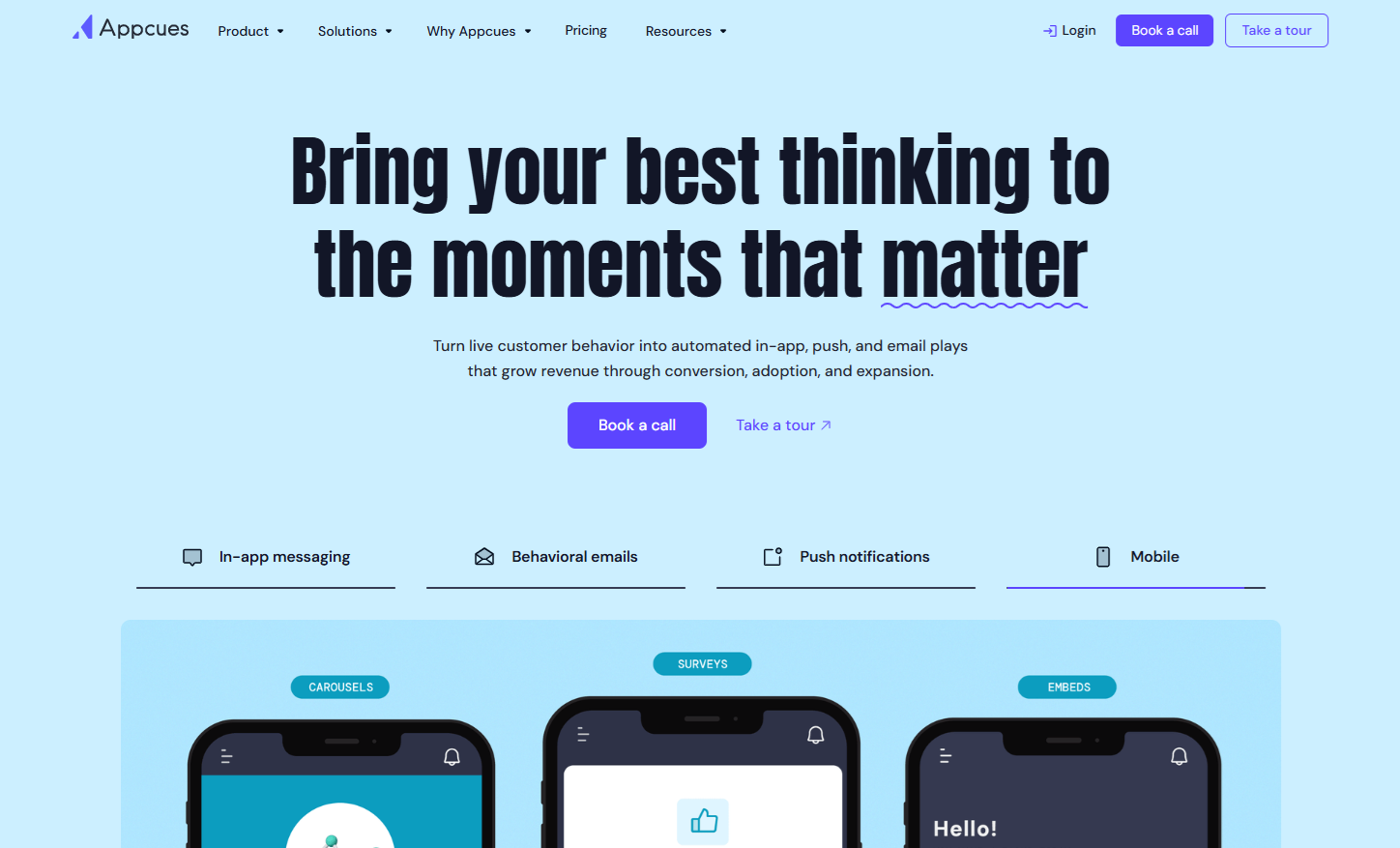
Appcues is one of the best-known names in digital adoption, built for teams that want to turn onboarding, feature announcements, and product nudges into growth levers. Like Stonly, it provides in-app walkthroughs, checklists, and contextual support, but Appcues leans more heavily into marketing-style personalization and lifecycle automation. Where Stonly combines customer self-service, agent knowledge, and AI-powered support, Appcues stays laser-focused on driving product-led growth: activating signups, guiding adoption, and timing upsells.
That makes Appcues a closer fit for SaaS growth teams than for call centers or enterprises needing a unified knowledge base. Stonly is broader, serving both agents and end-users, while Appcues is narrower but deeper when it comes to in-product messaging and segmentation.
Platform type: Product adoption and growth automation
Features:
Drag-and-drop onboarding flows, checklists, and tooltips
In-app messaging, behavioral email, and push notifications
Lifecycle-based targeting and segmentation
Integrations with Salesforce, HubSpot, and Segment
Resource centers and NPS surveys
A/B testing and detailed reporting
Multi-channel experiences (web + mobile)
Premium security and role-based access for enterprises
Pricing:
Appcues pricing scales by Monthly Active Users (MAUs). The Start plan begins at $300/month for 1 app with 5 licenses and 50 published experiences. Grow starts at $750/month, adding advanced features like NPS, premium integrations, and 15 licenses. Enterprise offers unlimited licenses, multi-product pricing, SLAs, and priority support, with custom quotes required.
6. WalkMe
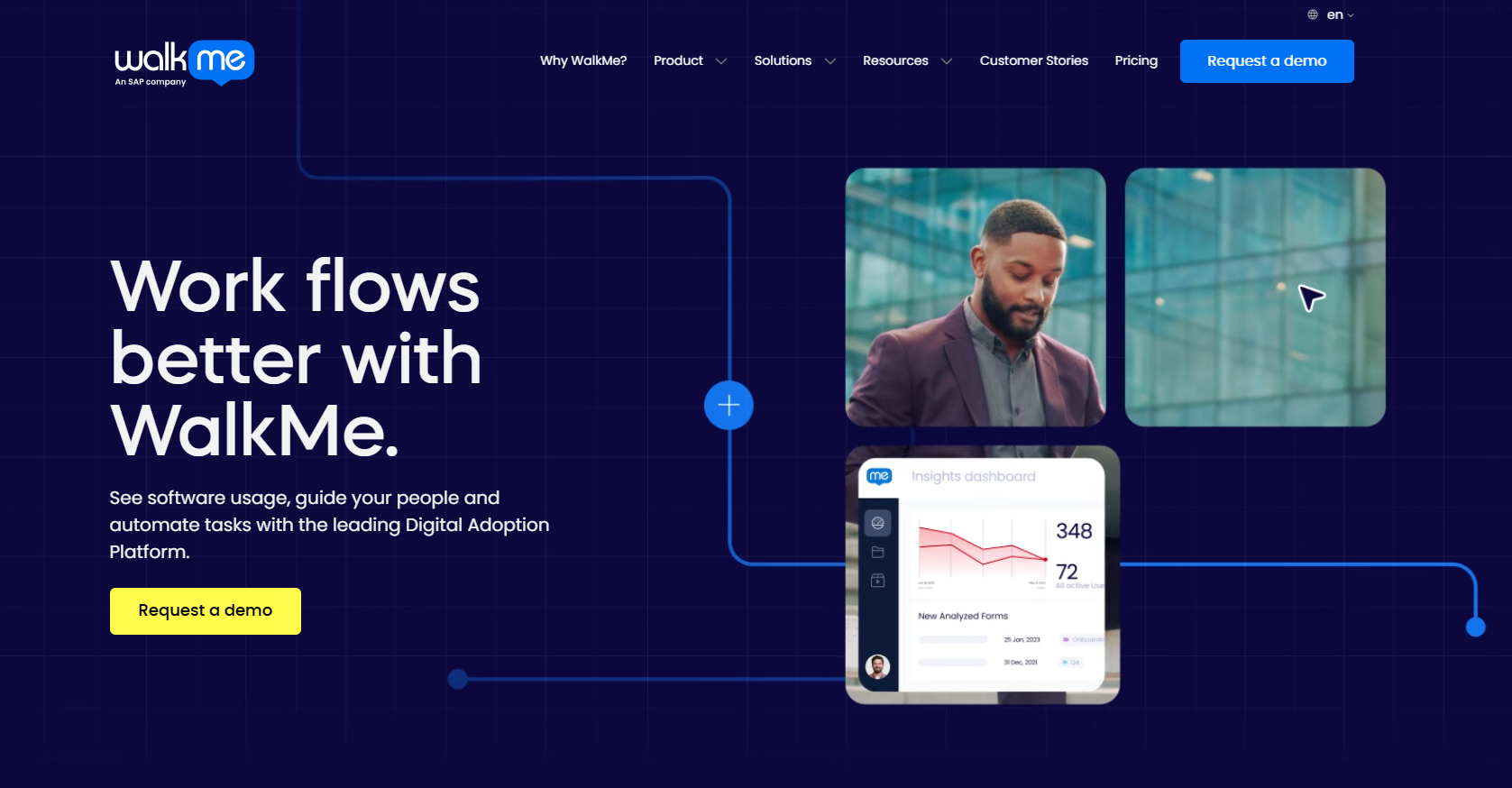
WalkMe is the heavyweight in the Digital Adoption Platform (DAP) space, built for enterprises managing sprawling software stacks and complex change initiatives. Like Stonly, WalkMe delivers interactive guides, checklists, and contextual help—but it goes further with deep analytics, workflow automation, and AI-driven segmentation. Stonly shines when it comes to blending customer self-service with agent enablement, while WalkMe is more about enterprise-wide digital transformation: optimizing processes across HR, IT, sales, and customer care.
If Stonly is about empowering customers and agents to find answers faster, WalkMe is about ensuring entire organizations adopt and comply with the tools they’ve invested in. That means it’s better suited to large-scale rollouts, compliance-heavy industries, or Fortune 500-level digital initiatives.
Platform type: Enterprise digital adoption and change management
Features:
Interactive in-app guides, tours, and tooltips
Workflow automation and task acceleration
AI-powered contextual guidance (WalkMeX)
Advanced analytics, behavior tracking, and DxA insights
Segmentation and targeting by role, workflow, or application
Surveys and feedback collection
Enterprise-grade security and white-label options
Works across desktop, web, and mobile apps
Pricing:
WalkMe does not publish fixed pricing. Instead, costs are custom quoted based on company size, deployment scope, and features selected. Packages include employee-facing DAPs, customer-facing onboarding, and AI add-ons like contextual assistance and session replay. Enterprises typically purchase annual contracts with professional services included.
7. Helpjuice

Helpjuice is a knowledge base platform designed to centralize documentation and make answers instantly searchable. Like Stonly, it helps reduce ticket volume and speed up onboarding, but the focus is different. Stonly leans heavily into interactive guides and process flows that adapt in real time, while Helpjuice emphasizes AI-powered knowledge management—turning scattered docs, Slack threads, and repeated tickets into one organized hub. If Stonly is the playbook for guided support, Helpjuice is the library that keeps institutional knowledge clean, current, and accessible.
Platform type: AI-powered knowledge base software
Features:
AI search that understands intent, not just keywords
Step-by-step tutorial builder for onboarding and training
Multi-language localization with one-click AI translation
AI suite for writing, updating, and tagging articles
Collaboration workflows and role-based access
Analytics to track search success and content gaps
Customizable themes and branding
Integrations with tools like Slack, Zendesk, and Teams
Pricing:
Helpjuice pricing starts at $249/month for small teams with 30 users. The $449/month plan adds AI tools, SSO, and 100 users. The $799/month unlimited plan removes user caps, expands storage, and includes unlimited customization credits. All plans come with fully customized branding, collaboration workflows, AI-powered content tools, and enterprise-grade security, plus a 14-day free trial.
8. Document360

Document360 is a knowledge base and documentation platform built for scaling teams that need both external customer support hubs and internal process docs. Like Stonly, it reduces support load and empowers self-service, but the two take different paths. Stonly leans on interactive guides, checklists, and decision trees to walk users through problems step by step, while Document360 focuses on structured, AI-powered documentation—making it ideal for organizations that need to publish technical docs, API references, or SOPs alongside customer knowledge bases. In short, Stonly is more guided and adaptive, Document360 is more structured and publishing-focused.
Platform type: Knowledge base and documentation software
Features:
AI writing and FAQ creation tools
AI-powered search with intent-based answers
Advanced editor for technical and non-technical teams
Multi-project support (public and private KBs)
Custom workflows and approval processes
Analytics for content, search, and feedback
Multi-language localization with auto-translation
Integrations with tools like Zendesk, Salesforce, Freshdesk, Intercom, and Slack
Ticket deflector and embedded help center widgets
Pricing:
Document360 offers three tiers: Professional for growing teams, Business with advanced analytics, workflows, and integrations, and Enterprise with SSO, audit trails, decision trees, and premium AI. Pricing is quote-based and scales with usage. A 14-day free trial is available, and startups get 50% off higher-tier plans.
9. WalkMe

WalkMe is the market leader in digital adoption, designed for enterprises that need to drive software usage, reduce friction, and automate workflows across complex systems. Unlike Stonly, which focuses on knowledge delivery and step-based guides, WalkMe embeds directly into applications to analyze usage, surface contextual help, and enforce process compliance. It’s ideal for large organizations managing change at scale, whether rolling out new software, training global teams, or improving data integrity.
Platform type: Digital Adoption Platform (DAP)
Features:
In-app guidance with tooltips, notifications, and tours
Workflow automation and AI-powered recommendations
Advanced analytics to track app usage and adoption
Personalized onboarding across desktop, web, and mobile
Segmentation and targeting by role, behavior, or workflow
Pre-configured templates and branding options
Multi-language support with localization tools
Enterprise-grade privacy, security, and admin controls
Pricing:
WalkMe provides custom pricing based on company size, deployment needs, and add-ons like WalkMeX AI, DxA analytics, or advanced security. Organizations must request a quote.
10. Whatfix
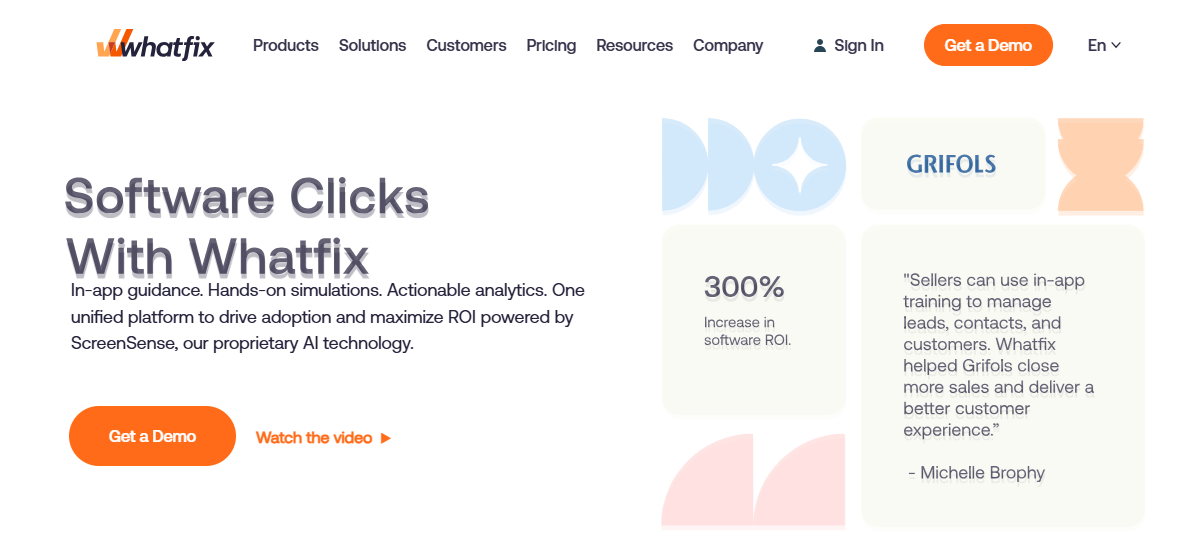
Whatfix is a flexible Digital Adoption Platform (DAP) that helps enterprises drive onboarding, training, and workflow optimization directly inside the apps employees use. Compared to Stonly, which focuses more on guided knowledge delivery, Whatfix embeds contextual, AI-powered help and analytics into live workflows, making it better suited for complex enterprise systems and multi-app environments.
Platform type: Digital Adoption Platform (DAP) with analytics and training
Features:
In-app guidance with walkthroughs, tooltips, and popups
AI-driven contextual support and smart search
Product analytics with no-code event tracking
“Mirror” sandbox for interactive training simulations
Workflow automation and compliance reinforcement
Employee and customer onboarding flows
Multi-language content creation and translation
Integrations with enterprise apps (CRM, ERP, HCM, etc.)
Pricing:
Whatfix provides custom pricing based on deployment scale, use cases, and add-ons like analytics, Mirror sandbox, or enterprise security. Quotes are required, but plans are typically tailored for large organizations.
Frequently asked questions
Which Stonly alternative is best for startups?
Startups need affordable, lightweight tools that deliver value fast. Flook is a great fit with its $49 lifetime deal for onboarding tours, checklists, and popups. Intercom is another strong choice, offering AI-driven support at startup discounts. Both are no-code friendly, quick to set up, and scale as your team grows.
Which Stonly alternative is best for enterprise companies?
Enterprise companies should look at WalkMe and Whatfix. WalkMe excels at large-scale digital adoption, workflow automation, and compliance-heavy rollouts across multiple apps. Whatfix provides flexible onboarding, contextual guidance, and analytics designed for complex enterprise systems. Both platforms prioritize enterprise security, integrations, and multi-app environments where adoption at scale is the main challenge.
Which Stonly alternative is best for user onboarding?
For onboarding specifically, Appcues and Flook stand out. Appcues offers drag-and-drop flows, checklists, and personalized experiences tied to lifecycle stages, making it ideal for SaaS growth teams. Flook is lighter but perfect for quick, no-code tooltips and tours. Together, they make onboarding faster, smoother, and more engaging for both early-stage startups and scaling products.
Which Stonly alternative is best for user documentation?
Helpjuice and Document360 are the strongest choices for user documentation. Helpjuice centralizes knowledge into a searchable, AI-powered hub that reduces ticket volume and improves onboarding. Document360 focuses on structured publishing for technical docs, SOPs, and API references. Both tools give teams the ability to scale knowledge management with localization, analytics, and collaboration features.
Which Stonly alternative is best for internal training?
Internal training often requires more structured, guided experiences. Whatfix provides in-app walkthroughs and analytics that support employee learning directly in their workflow. Helpjuice is another solid option for centralizing onboarding and training materials, making knowledge instantly accessible. Both tools cut ramp-up time, reduce repetitive questions, and support continuous learning inside organizations.
Choosing the right Stonly alternative comes down to your team’s goals—whether it’s onboarding, support, or enterprise-wide adoption.
If you’re looking for a lightweight, no-code option to get users activated quickly, give Flook a try.